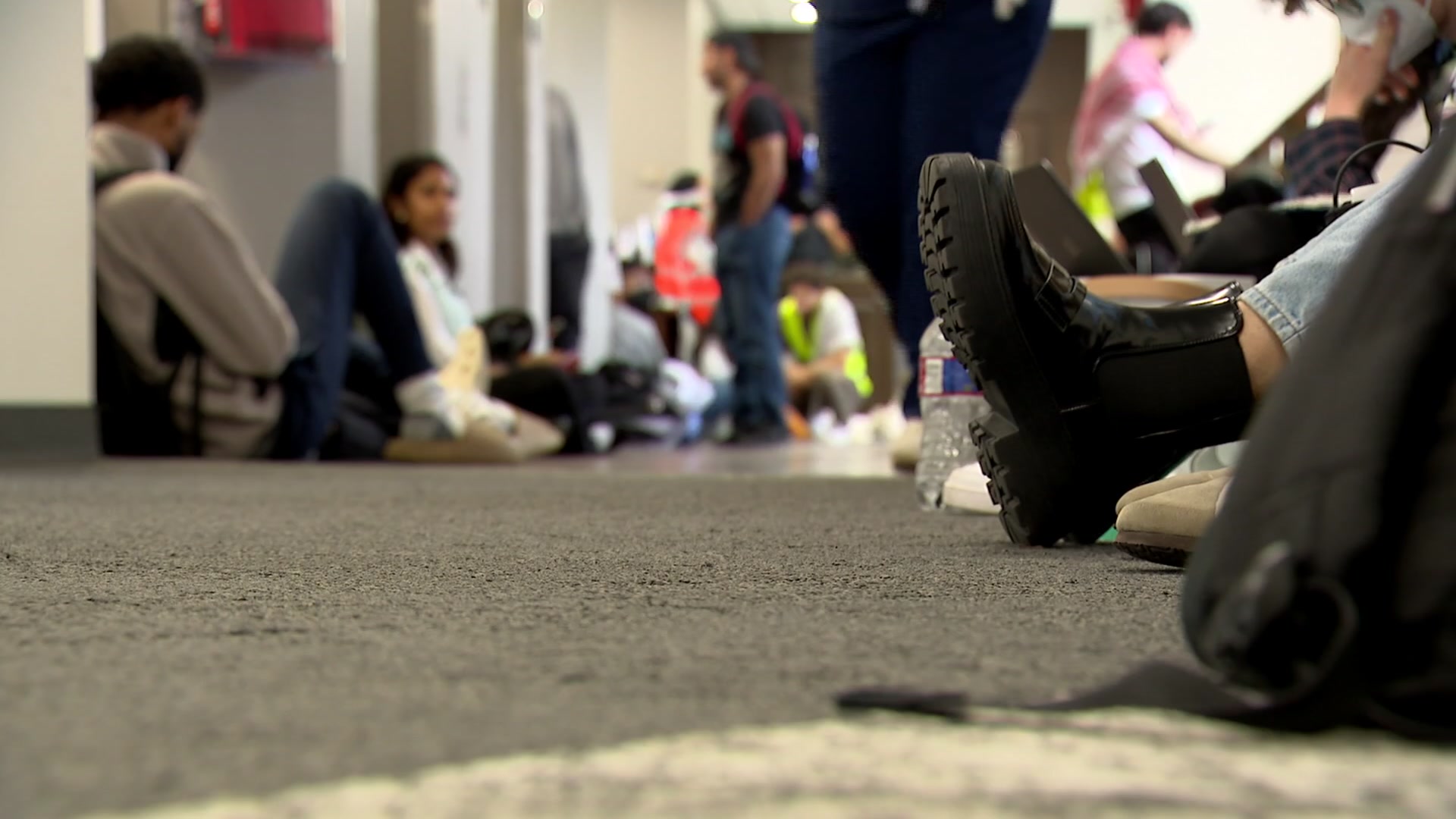Behind Jim and Bettye Baker's Seagoville home sits the kennel for Oak Hill Animal Rescue, the pet organization the Bakers founded to save animals from being euthanized.
Since it opened in 2006, the Bakers said they have found homes for at least 500 dogs.
So when a veterinarian called them about an ailing pit bull pup named Chili, the decision to adopt her was a no-brainer.
When Chili was 8 weeks old, someone threw her over a fence onto concrete, breaking her back and cracking her pelvis. A vet told the Bakers she had suffered neurological damage and would never be able to use her hind legs.
Chili grew to be 42 pounds. Her chest is broad and muscular. The Bakers swear she can smile because when Chili pants, the corners of her mouth curl into a wide grin.
Eventually, Chili learned to get around by using her front legs and dragging the rest of her body. But the dragging took a toll on her tail, which is covered in scar tissue.
When she was a year old, the Bakers discovered Eddie's Wheels, a Massachusetts-based company that makes lightweight aluminum wheelchairs for pets. A padded saddle in the shape of a figure-eight holds their back legs in place.
Local
The latest news from around North Texas.
The Bakers bought one of the wheelchairs -- which cost between $325 and about $1,400 -- for Chili, who enjoys running around the backyard.
"She just flies in the thing," Jim Baker said.
Last year, the Bakers were with Chili at a pet adoption event in North Dallas when a woman approached them.
"This dog needs to go to Baylor," said the lady, a nurse at Baylor Hospital who was familiar with its Animal-Assisted Therapy Program. According to a study by the Center for Human-Animal Interaction at Virginia Commonwealth University, a majority of patients who suffered from acute psychiatric problems showed lower anxiety levels after interacting with therapy dogs.
But not all dogs who try out make the cut for Baylor's program.
"Just because your dog likes people or is a friendly dog does not mean that they would make a good therapy dog," said Linda Marler, the program's director.
Animals accepted at Baylor must pass a 15-minute test during which pans are dropped, and crutches and wheelchairs circle the dog to determine its reaction. There is also a pain tolerance portion to make sure the dog will not bark or bare its teeth if it is hurt.
Chili and Arlo, a disabled dachshund adopted by the Bakers three years ago, have been a big hit with Baylor patients. Of the 86 dogs making rounds at the hospital, they are the only two disabled ones, and this month marks their first anniversary of bringing smiles to patients' faces.
At a therapy gym inside the Baylor Institute of Rehabilitation, some patients laughed recently when they spotted the canine visitors. Others stared, wide-eyed.
"Patients just absolutely love them," Jim Baker said. "There's something about that contact, seeing a dog in a wheelchair who is so happy and thriving."
Kristen Hill, an occupational therapist at the institute, has seen the dogs repeatedly boost the attitudes of her patients.
"It definitely makes them smile," Hill said. "They're able to relate to the dogs" because most patients use wheelchairs themselves."
Tanner Perales, 17, was lying down on a therapy bed when he spotted Arlo. The dog has a degenerative spinal disease, a common condition in dachshunds because of their long backs, and his lower body is paralyzed. Now 6 years old and weighing 12 pounds, he is short and scrawny. When he looks up, his long, chocolate brown ears flop back.
The animal's visit lifted the spirits of Perales, who broke his neck in June when he jumped into a lake unaware that the water was only a foot deep.
When Bettye Baker placed Arlo on the bed with Perales, the dog nuzzled the teen's arm with his nose. Chili dropped by, too.
"It was neat seeing them," Perales said with a smile.
"She's adorable!" said Sandy Wilson as she stroked Chili's head and looked into the dog's brown eyes. "You've made me so happy today."
Wilson, from North Dallas, had a brain tumor removed earlier this year and was at the institute for four weeks. She said therapy dogs are "nonjudgmental."
"Especially these two," Wilson said. "They're handicapped. But look, they're happy."
Although the wheelchairs offer Chili and Arlo more independence, they still have some limitations. When Chili is outside in the yard, she sometimes runs into a hole, flipping her wheelchair.
The dogs can only use their wheelchairs for about four hours at a time because it's so demanding on their upper bodies. And both animals have what Bettye Baker calls "plumbing problems." Chili wears a skirt to hide the diaper she wears when she visits patients. Because she is in a wheelchair, she can't squat to relieve herself like other dogs.
And with Arlo, the Bakers have to press his bladder to make him urinate.
"If somebody else had them, (they) probably would have just been euthanized," Bettye Baker said.
Instead, Jim Baker said Chili and Arlo are an inspiration to patients who face similar struggles.
The dogs, he said, have "been a blessing for a lot of people."



